英语情态动词讲解及练习(附答案)
【英语】高中必备英语情态动词技巧全解及练习题(含答案)
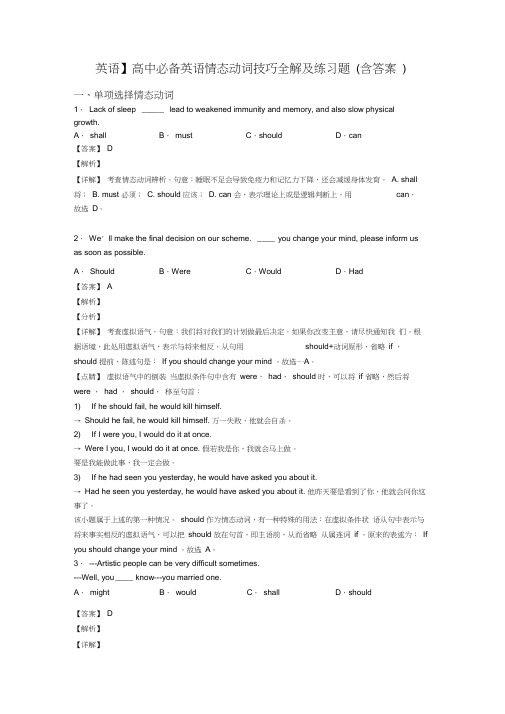
英语】高中必备英语情态动词技巧全解及练习题(含答案)一、单项选择情态动词1.Lack of sleep _____ lead to weakened immunity and memory, and also slow physical growth.A.shall B.must C.should D.can【答案】D【解析】【详解】考查情态动词辨析。
句意:睡眠不足会导致免疫力和记忆力下降,还会减缓身体发育。
A. shall 将;B. must 必须;C. should 应该;D. can 会,表示理论上或是逻辑判断上,用can,故选D。
2.We' ll make the final decision on our scheme. ____ you change your mind, please inform us as soon as possible.A.Should B.Were C.Would D.Had【答案】A【解析】【分析】【详解】考查虚拟语气。
句意:我们将对我们的计划做最后决定。
如果你改变主意,请尽快通知我们。
根据语境,此处用虚拟语气,表示与将来相反,从句用should+动词原形,省略if ,should 提前,陈述句是:If you should change your mind 。
故选⋯⋯A。
【点睛】虚拟语气中的倒装当虚拟条件句中含有were,had,should 时,可以将if 省略,然后将were ,had ,should,移至句首:1) If he should fail, he would kill himself.→ Should he fail, he would kill himself. 万一失败,他就会自杀。
2) If I were you, I would do it at once.→ Were I you, I would do it at once. 假若我是你,我就会马上做。
英语情态动词形式讲解附答案百度文库
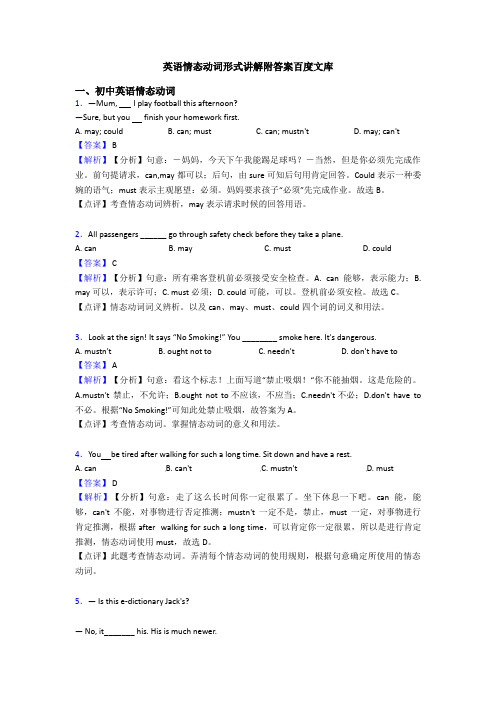
英语情态动词形式讲解附答案百度文库一、初中英语情态动词1.—Mum, I play football this afternoon?—Sure, but you finish your homework first.A. may; couldB. can; mustC. can; mustn'tD. may; can't【答案】 B【解析】【分析】句意:-妈妈,今天下午我能踢足球吗?-当然,但是你必须先完成作业。
前句提请求,can,may都可以;后句,由sure可知后句用肯定回答。
Could表示一种委婉的语气;must表示主观愿望:必须。
妈妈要求孩子“必须”先完成作业。
故选B。
【点评】考查情态动词辨析,may表示请求时候的回答用语。
2.All passengers ______ go through safety check before they take a plane.A. canB. mayC. mustD. could【答案】 C【解析】【分析】句意:所有乘客登机前必须接受安全检查。
A. can能够,表示能力;B. may可以,表示许可;C. must必须;D. could可能,可以。
登机前必须安检。
故选C。
【点评】情态动词词义辨析。
以及can、may、must、could四个词的词义和用法。
3.Look at the sign! It says “No Smoking!” You ________ smoke here. It's dangerous.A. mustn'tB. ought not toC. needn'tD. don't have to【答案】 A【解析】【分析】句意:看这个标志!上面写道“禁止吸烟!“你不能抽烟。
这是危险的。
A.mustn't 禁止,不允许;B.ought not to不应该,不应当;C.needn't不必;D.don't have to 不必。
高中英语情态动词形式练习题40题(答案解析)

高中英语情态动词形式练习题40题(答案解析)1.She ____ know the answer.She always gets good grades.A.mustB.can'tC.mayD.might答案解析:A。
“She always gets good grades.”表明她总是取得好成绩,所以“一定”知道答案,must 符合语境。
can't 表示不可能;may 和might 表示可能,语气较弱,不符合此处语境。
2.____ I borrow your pen?A.MustB.CouldC.WouldD.Shall答案解析:B。
“borrow your pen”是请求,could 用于委婉地请求许可,符合语境。
must 表示必须;would 表示意愿或过去习惯;shall 用于第一人称征求对方意见,均不符合此处借笔的请求语境。
3.You ____ be careful when crossing the road.A.mustB.canC.mayD.could答案解析:A。
过马路时“一定”要小心,must 表示必须,符合语境。
can 表示能够;may 表示可能;could 表示能够( 语气更委婉),均不如must 强烈。
4.He ____ come to the party if he finishes his homework.A.mayB.mustC.can'tD.would答案解析:A。
“if he finishes his homework”表示一种可能性,may 表示可能,符合语境。
must 表示必须;can't 表示不可能;would 表示意愿或过去习惯,均不符合。
5.They ____ have gone on vacation.They haven't been at school for days.A.mustB.mayC.can'tD.could答案解析:A。
高考英语情态动词解题技巧分析及练习题(含答案)
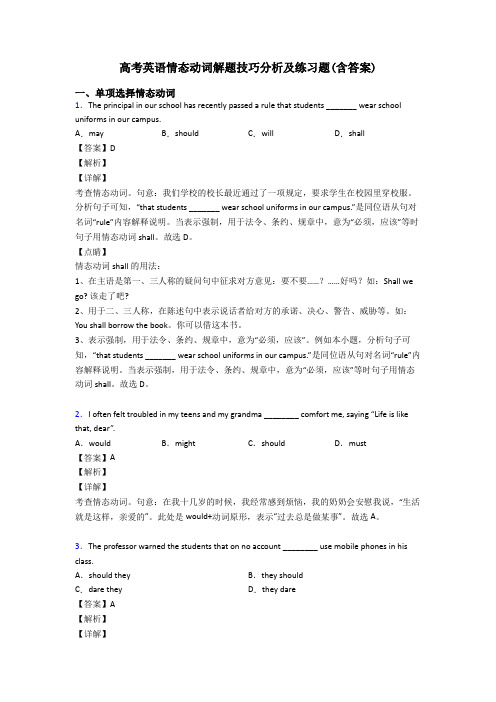
高考英语情态动词解题技巧分析及练习题(含答案) 一、单项选择情态动词 1.The principal in our school has recently passed a rule that students _______ wear school uniforms in our campus. A.may B.should C.will D.shall 【答案】D 【解析】 【详解】 考查情态动词。句意:我们学校的校长最近通过了一项规定,要求学生在校园里穿校服。分析句子可知,“that students _______ wear school uniforms in our campus.”是同位语从句对名词“rule”内容解释说明。当表示强制,用于法令、条约、规章中,意为“必须,应该”等时句子用情态动词shall。故选D。 【点睛】 情态动词shall的用法: 1、在主语是第一、三人称的疑问句中征求对方意见:要不要……?……好吗?如:Shall we go? 该走了吧? 2、用于二、三人称,在陈述句中表示说话者给对方的承诺、决心、警告、威胁等。如:
You shall borrow the book。你可以借这本书。
3、表示强制,用于法令、条约、规章中,意为“必须,应该”。例如本小题,分析句子可
知,“that students _______ wear school uniforms in our campus.”是同位语从句对名词“rule”内容解释说明。当表示强制,用于法令、条约、规章中,意为“必须,应该”等时句子用情态动词shall。故选D。
2.I often felt troubled in my teens and my grandma ________ comfort me, saying “Life is like that, dear”. A.would B.might C.should D.must 【答案】A 【解析】 【详解】 考查情态动词。句意:在我十几岁的时候,我经常感到烦恼,我的奶奶会安慰我说,“生活就是这样,亲爱的”。此处是would+动词原形,表示“过去总是做某事”。故选A。
(完整版)初中英语情态动词讲解练习及答案.doc
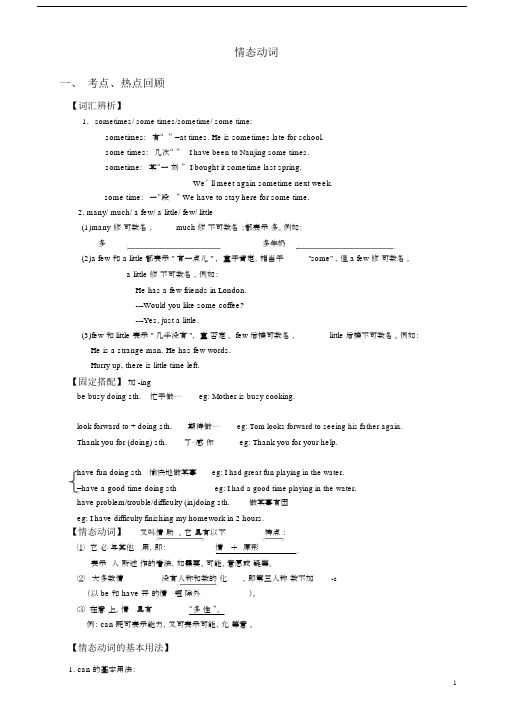
情态动词一、考点、热点回顾【词汇辨析】1.sometimes/ some times/sometime/ some time:sometimes:有“ ”=at times. He is sometimes late for school.some times:几次“ ”I have been to Nanjing some times.sometime:某“一刻”I bought it sometime last spring.We’ ll meet again sometime next week.some time:一“段”We have to stay here for some time.2. many/ much/ a few/ a little/ few/ little(1)many 修可数名,much 修不可数名;都表示多。
例如:多多牛奶(2)a few 和 a little 都表示 " 有一点儿 " ,重于肯定,相当于"some" ,但 a few 修可数名,a little 修不可数名,例如:He has a few friends in London.---Would you like some coffee?---Yes, just a little.(3)few 和 little 表示 " 几乎没有 ",重否定。
few 后接可数名,little 后接不可数名。
例如:He is a strange man. He has few words.Hurry up, there is little time left.【固定搭配】加 -ingbe busy doing sth.忙于做⋯⋯eg: Mother is busy cooking.look forward to + doing sth.期待做⋯⋯eg: Tom looks forward to seeing his father again.Thank you for (doing) sth.了⋯感你eg: Thank you for your help.have fun doing sth愉快地做某事eg: I had great fun playing in the water.=have a good time doing sth eg: I had a good time playing in the water.have problem/trouble/difficulty (in)doing sth.做某事有困eg: I have difficulty finishing my homework in 2 hours.【情态动词】又叫情助。
【英语】高中英语情态动词解题技巧分析及练习题(含答案)及解析
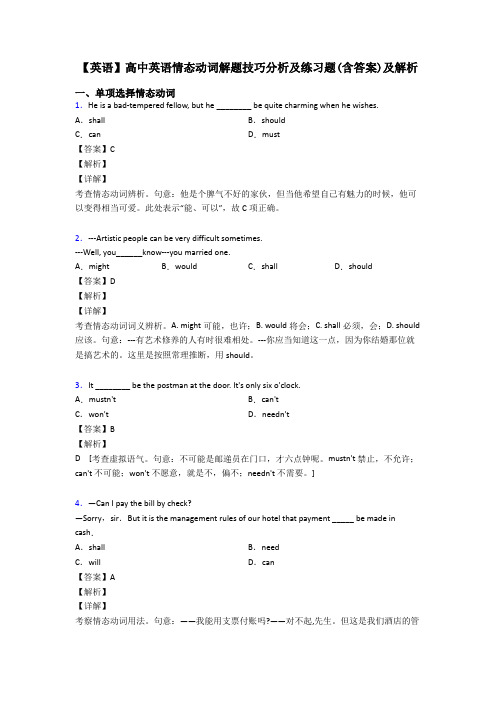
【英语】高中英语情态动词解题技巧分析及练习题(含答案)及解析一、单项选择情态动词1.He is a bad-tempered fellow, but he ________ be quite charming when he wishes.A.shall B.shouldC.can D.must【答案】C【解析】【详解】考查情态动词辨析。
句意:他是个脾气不好的家伙,但当他希望自己有魅力的时候,他可以变得相当可爱。
此处表示“能、可以”,故C项正确。
2.---Artistic people can be very difficult sometimes.---Well, you______know---you married one.A.might B.would C.shall D.should【答案】D【解析】【详解】考查情态动词词义辨析。
A. might可能,也许;B. would将会;C. shall必须,会;D. should 应该。
句意:---有艺术修养的人有时很难相处。
---你应当知道这一点,因为你结婚那位就是搞艺术的。
这里是按照常理推断,用should。
3.It ________ be the postman at the door. It's only six o'clock.A.mustn't B.can'tC.won't D.needn't【答案】B【解析】D[考查虚拟语气。
句意:不可能是邮递员在门口,才六点钟呢。
mustn't 禁止,不允许;can't 不可能;won't 不愿意,就是不,偏不;needn't 不需要。
]4.—Can I pay the bill by check?—Sorry,sir.But it is the management rules of our hotel that payment _____ be made in cash.A.shall B.needC.will D.can【答案】A【解析】【详解】考察情态动词用法。
【英语】高考必备英语情态动词技巧全解及练习题(含答案)
【英语】高考必备英语情态动词技巧全解及练习题(含答案)一、单项选择情态动词1.It wasn’t right to me that such near neighbors not know one another.A.could B.wouldC.should D.might【答案】C【解析】【详解】考查情态动词。
句意:对我来说,很不正常,如此近的邻居居然不认识。
A. could可能,能够;B. would将;C. should竟然;D. might可能,也许。
should 作为情态动词,可以用来表示意外、惊喜或者在说话人看来是不可思议的,常常译为"竟会"、"居然",住的这么近的邻居居然不认识。
表示意外,所以答案选C。
【点睛】should的用法1、should 作为情态动词,通常用来表示现在或将来的责任或义务,译作“应该”、“应当”,这时它可以和 ought to, be supposed to 互换使用.例如:You should (= ought to ) tell your mother about it at once.2、should 作为情态动词,可以用在条件状语从句中,表示语气较强的假设,译作“万一”、“竟然”,这时也可将 should 置于从句之首,即将 should 放在主语前面,而省略从属连词 if。
例如:If you should fail to come, ask Mrs Chen to work in your place. (= Should you fail to come, ask Mrs Chen to work in your place. )3、should 作为情态动词,可以表示谦逊、客气、委婉之意,译为“可……”、“倒……”。
例如:I should say that it would be better to try it again.4、should 作为情态动词,可以用来表示意外、惊喜或者在说话人看来是不可思议的.尤其在以 why, who, how 等开头的修辞疑问句或某些感叹句中常常译为“竟会”、“居然”。
(英语)高中英语情态动词的技巧及练习题及练习题(含答案)及解析
(英语)高中英语情态动词的技巧及练习题及练习题(含答案)及解析一、单项选择情态动词1.I love the weekend, because I ________ get up early on Saturdays and Sundays. A.mustn’t B.needn’tC.wouldn’t D.shouldn’t【答案】B【解析】【详解】考查情态动词。
句意:我喜欢周末,因为周六周日不必早起。
A. mustn’t不能,禁止;B. needn’t不必;C. wouldn’t不会;D. shouldn’t不应该。
此处表示“不必”,故B项正确。
2.Look! There are so many mistakes in your composition. You ________ have fixed full attention on it.A.can B.shouldC.need D.might【答案】B【解析】【详解】考查情态动词。
句意:看!你的作文里有那么多的错误。
你本应该把所有的注意力都集中在它上面的。
表示“本应该做但实际上没有做”应该用should have done结构,can have done 表示可能;need表示需要;might have done表示可能做过某事;故选B。
3.(2018·北京) In today’s information age, the loss of data _________ cause serious problems for a company.A.need B.shouldC.can D.must【答案】C【解析】考查情态动词。
句意:在今天的信息时代,数据的丢失有时会对一个公司造成严重的问题。
数据丢失造成严重问题是客观上会发生的情况,即“客观可能性”,故该空应用情态动词can。
C选项正确。
其余情态动词均没有该用法。
need需要;should应该,竟然;must必须,肯定。
100例全面解析初中英语情态动词专项练习与答案
初中英语:情态动词真题100题第一部分:1-50 真题解析第二部分:51-100练习及答案1.—Mommy, may I go swimming now?—Yes, honey, but remember that you _____go with your Daddy.A.must B.may C.would D.can全面解析:——妈妈,我现在可以去游泳了吗?——是的,亲爱的,但记住你必须和你爸爸一起去。
must必须;may可以,可能;would将会;can能;根据yes和转折词but,可知是可以去但必须跟爸爸一起,must符合题意,故答案为A。
2.— Whose notebook is this?— It _______________ Bill's. It has his name on it.A.can't be B.must be C.can be D.mustn't be全面解析:——这是谁的笔记本?——一定是比尔的。
can't be不可能是,表示否定的推测;must be 一定是;can be可以是,可能;上面有他的名字。
mustn't be 不能;根据It has his name on it. 上面有他的名字,可知,这个笔记本一定是吉姆的,表示肯定的推测,故答案为B。
3.—____________ you call back tomorrow?— Of course I can.A.Can B.Must C.May D.Need全面解析:——你能明天再打来吗?——我当然可以。
can,可以;must,必须;may,可以,主语常用第一人称;need,必须。
都是情态动词。
从答语中can知,问句也用can。
故选A。
4.— Two hundred yuan for such a T-shirt! You ___________________ be joking!— I'm not joking. It's made of silk.A.can't B.can C.need D.must全面解析:——这样一件T恤要两百块!你一定是在开玩笑!——我不是在开玩笑。
高考英语情态动词练习题50题含答案解析
高考英语情态动词练习题50题含答案解析1.He be in the classroom. I saw him go out just now.A.mustn'tB.can'tC.may notD.might not答案解析:B。
“can't”表示“不可能”,根据后面“I saw him go out just now(我刚才看到他出去了)”可知他不可能在教室。
“mustn't”表示“禁止”;“may not”和“might not”表示“可能不”,语气较弱,不符合语境。
2.In my opinion, she finish the task in time. She is very efficient.A.mustB.canC.couldD.may答案解析:B。
“can”表示“能够”,根据“She is very efficient((她非常高效)”可知她能够及时完成任务。
“must”表示“必须”,语气过于强硬;“could”表示“能够”,但语气比“can”委婉;“may”表示“可能”,不符合语境。
3.You borrow my book without asking. You should ask first.A.mustn'tB.can'tC.may notD.might not答案解析:A。
“mustn't”表示“禁止”,没有经过询问禁止借我的书。
“can't”表示“不可能”;“may not”和“might not”表示“可能不”,均不符合语境。
4. he come to the party tonight? I'm not sure.A.MustB.CanC.CouldD.May答案解析:D。
“may”表示“可能”,后面回答“I'm not sure((我不确定)”符合语境。
“must”表示“必须”;“can”表示“能够”;“could”表示“能够”,语气比“can”委婉,均不符合语境。
- 1、下载文档前请自行甄别文档内容的完整性,平台不提供额外的编辑、内容补充、找答案等附加服务。
- 2、"仅部分预览"的文档,不可在线预览部分如存在完整性等问题,可反馈申请退款(可完整预览的文档不适用该条件!)。
- 3、如文档侵犯您的权益,请联系客服反馈,我们会尽快为您处理(人工客服工作时间:9:00-18:30)。
英语情态动词讲解及练习(附答案)情态动词讲解定义:情态动词表示说话人对动作的态度,比如:需要,可能,意愿,猜测或者怀疑等等。
情态动词本身有一定意思,但不完全,不能单独作谓语,必须与动词原形连用。
否定句中,在情态动词后面加not。
情态动词有:must, shall, should, had better 词形无变化can(could), may(might), will(would) 词形有变化need既可以是情态动词,也可以是实义动词,具有双重性。
一、can 表示“能,会”,否定为:can’t = can not = cannot 其过去式为:could→couldn’t(1)表示会做某事,有能力做某事。
意思= be able toe.g. He can speak English, but he can’t speak Japanese.= He is able to speak English, but he isn’t able to speak Japanese.I could smile but I couldn’t speak w hen I was 2 months old.= I was able to smile but I wans’t able to speak when I was 2 months old.区别:① can只用于现在时和过去时(could), be able to 可用于各种时态。
e.g. They will be able to tell you the news soon.Mingming has been able to count numbers.② be able to 不与can连用,但可以和其他情态动词或助动词连用。
e.g. He may be able to speak English very well some day in the future.He may can speak…………………………………………………..He can be able to speak……………………………………………..(2)用于征求意见——Can /Could /May /Might I(we) do sth?——Yes, you can/may. / Of course you can.——No(Sorry), you can’t. /mustn’t.注意:①此处的could和might都不表示过去,只是语气上的委婉,不用作回答。
②否定回答中,表示对他人造成一定伤害或影响,或表示违反了某种规定或法律时,用mustn’t较好。
e.g. ——Could I take the book out of the library? ——Sorry, you mustn’t.——May I smoke here? ——I’m afraid you mustn’t.③表示过去能力时,could 提问,只能用could回答。
e.g. ——Could you ride a bike when you were 4 years old? ——No, I couldn’t.(3)表提出意见或请求Can/Could you (please) do sth? = Would you (please) do sth? (此句型中some 不变any)e.g. Could you please give me a hand?Would you please pass me some salt?(4) 表示允许或承诺=maye.g. OK. You can /may come and find me at any time tomorrow.(5) 表示有一定把握的推测,用于否定句和疑问句。
肯定句用must。
表示没有把握的推测,用may /might。
e.g. —— The window is broken. Who did it?—— It may be Mary.——It can’t be Mary. The window is in the men’s toilet.—— Can it be anyone else?—— Then, it must be Bob. I saw him go into the toilet just now.二、may 表示“可以,可能”,否定形式may not(1) 表示没有把握的推测,“可能,也许”。
e.g. He may have a lot of work to do. = Maybe he has a lot of work to do.You may be right. = Maybe you are right.(2) 表示请求“我可以……吗?”表示许可“你可以……” e.g. You may /can go now.——May I use your pen?——Yes, you may. / Yes, please. / Go ahead.——No, you can’t. / mustn’t.三、must 表示“必须,肯定,一定”,否定形式mustn’t = must not(1) 表示必须,意思同have toe.g. ——Must I do it now?——Yes, you must.——No, you don’t have to. / No, you needn’t. (注意:否定回答不用mustn’t)Children mustn’t play on the road because it’s too dangerous. (mustn’t只表“禁止”)He doe sn’t have to go away from here.=He needn’t leave here.区别:①must表达主观意愿的“必须”,have to表达客观上或按道理说“不得不”。
e.g. I must study hard.It’s too late. I have to go now.②must 没有人称和时态的变化,而have to有。
e.g. He had to walk back home because he lost all his money.Mom will be away for a week, so we will have to do thecooking by ourselves.(2) 表示有把握的肯定句中的推测,“肯定,一定”,见“一、(5)”四、need 表示“需要”,否定形式needn’t = need not(1)作情态动词,仅用于否定句和疑问句。
e.g. He needn’t go home early yesterday. = He didn’t need/have to go home early yesterday.Need I call him right now? ——Yes, you must.(注意:肯定回答不用need)——No, you needn’t. /No, you don’t have to.(2)作实义动词,need sth./sb.need to do sth. 否定形式don’t need to = don’t have to 表示“不必”e.g. I need some help.He needed to go home early yesterday.Do I need to call him right now? ——Yes, you do. / ——No, you don’t.(3) need 作名词be in (great) need of sth = need sth (badly) “非常需要某物”meet the need “满足需要(需求)”there is/was no need (for sb) to do sth “某人没必要做某事”五、should 表示“应该”,否定形式shouldn’t = should note.g. We should try our best to help the poor little girl.You shouldn’t be lazy.六、had better do表示“最好是做……”,否定形式had better not doe.g. You’d better not drink so much coffee.区别:It’s better for you to do more exercise and not to have so much junk food.七、would 表示意愿常见句型:①表请求Would you please do…? ——OK…. / Sorry, ….②Would you like sth? ——Yes, please. / No, thanks.Would you like to do sth? ——I’d love to.——I’d love to, but….(注意:以上句型中,some不变any)情态动词精选练习1. _____ I go out to play now,Mum? No,you______ .A.May,shouldn’t B.Can,needn’tC.Must,can’t D.May.mustn’t2. Help me with this case._______ you?A.don’t B.will C.do D.shall3. They started early that morning in order that they______ there before noon.A.might get B.may get C.would get D.got4. A teacher do every exercise,but a pupil________.A.needn’t,must B.may not,must C.needn’t, needn’t D.can’t, must 5. If you _____ do as I tell you,you______ go to the party.A.can,shan’t B.will, won’t C.won’t,shall D.won’t, shan’t A.will B.would C.do D.can7. Don’t believe him.His story ______ be true.A.mustn’t B.needn’t C.sh ouldn’t D.may not8. ---She must have gone back to the valley.---No, she ____ . The entrance to it was nowhere to be found.A.mustn’t B.needn't C.couldn’t D.hadn’t9. You need not do it at once,________?A.needn’t you B.mustn’t youC.don’t you D.need you10. He must be in the classroom.______ he?A.mustn’t B.can’t C.isn’t D.Can11. Let’s go to the library.shall we? ________.A.No,I can’t B.Yes.I will C.Yes,thank you D.No,We’d better not 12. You ought to have called him yesterday.Yes, I know I_______.A.ought to B.ought to haveC.ought to have done D.ought to have called13. ---Why did you keep it a secret from me?---I ____ about it.A.should be told B.ought to have been toldC.should have told D.ought to be told14. The work _______ be finished in such a short time.A.wasn’t able to B.couldn’t C.ought D.could15. He looks very tired.He ____ to bed too late last night.A.must go B.must have gone C.could go D.didn’t go16. The door ______ lock.A.can’t B.may not C.won’t D.mustn’t17. As a soldier,you ______ do as the head tells you.A.will B.shall C.may D.ought18. How _____ you be so careless?A.can B.will C.could D.may19. I talked for a long time,and in the end I____ make her believe me.A.could B.can C.must D.was able to20. Did you scold him for carelessness ? Yes,but _____ it.A.I’d rather not do B.I’d rather not have doneC.I shouldn’t do D.I’d better n ot do21. He needn’t come to attend the meeting._______ ?A.didn’t he B.doesn’t he C.need he D.must he22. Fish _______ die without water.A.will B.should C.shall D.must23. We’d better hurry.Our teacher _________ us.A.wait for B.must wait forC.must be waiting for D.has waited for24. I saw him leave the room an hour ago.He ______ at this time.A.mustn’t be working B.can’t be workingC.can’t work D.may not being working25. ______ basketball every day?A.Did you used to playing B.Did you use to playC.Use you to play D.Used you play26. Why______ you keep on troubling me with such questions while I am busy ?A.could B.can C.must D.will27. ---You were driving at 100km an hour, sir.---But officer,I____ ,my car can’t go more than 90.A.may not have been B.couldn’t have beenC.would have been D.needn’t have been28. You ______ call him if you want to,but you______ ,for he’ll surely come he re soon.A.can,needn’t B.may, mustn’tC.have to,needn’t D.can, doesn’t need29. At last he _____ finish the work ahead of time.A.could B.was able toC.could have done D.would have been able to30. There must be some enemy soldiers in the forest._______ any behind the church?A.Must there be B.Should there be C.May there be D.Can there be 31. The shy girl____ dance before so many strangers,______she?A.daren’t,does B.daren’t,dare C.doesn’t,dare D.dare not.Dares 32. “When ___ he leave the hospital?” I asked the doctor.A.will B.shall C.can D.may33. ---They haven’t finished the work up to now.---Well,they______.A.should have B.should C.ought to D.ought have34. The money was soon spent,so she ______ go hungry.A.must B.had to C.might D.Should35. Jack studied hard and _______ pass the examination.A.could able to B.would C.was able to D.ought36. You don’t look well,you _______ have a fever.A.might B.can C.shall D.should37. You are running a fever,you _____ to see the doctor.A.need go B.must have gone C.should go D.can go38. I ______ take the job.No one ____ stop me.A.will,can B.can,must C.must,can D.will, must39. There used to be a high tower here,______ ?A.was there B.wasn’t there C.used there D.usedn’t there 40. Whenever the teacher was not there, the children _______ make a lot of noise.A.will B.would C.were to D.were going to41. He must be shy, _______ he?A. A.must B.mustn’t C.is D.isn’t42. I must do it, ________ I?A.do B.don’t C.must D.mustn’t43. You did not go to the party yesterday, or I ___ you.A.would see B.could meet C.might have seen D.might see 44. ---How do you like the food here?---Oh,excellent! We ______ a better hotel.A.can’t find B.won’t findC.mustn’t have found D.couldn’t have found45. ---We were waiting for you this time yesterday.---Sorry,I ______ you to tell you that I couldn’t come.A.must have called B.would have been callingC.could have been calling D.should have called46. ---Would you mind returning the book tomorrow?---______.A.Ok,I will B.Sure, I wouldn’tC.Yes,I wouldn’t D.Why, I wouldn’t47. See who’s t here! _____ it be Mary?A.May B.Must C.Can D.Will48. My little son ______ out a1one at night.A.dares not go B.dares not to goC.dare not to go D.doesn’t dare to go49. You ______ miss seeing so good a film,i t is one of the best films I’ve ever seen.A.had better not to B.have better not toC.had better to not D.had better not50. It is strange that she _______ so.A. think B.thinks C.will think D.thought51. _______ you rather sit at the back?。
